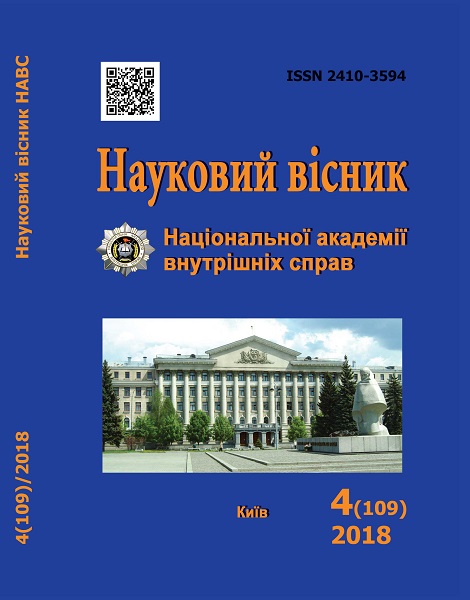Іmprovement of Legal Background Operative-Search Activity
Abstract
All transformations taking place in state legal environment, law enforcement activity necessitate the determination of the peculiarities of its legal regulation and formulation of relevant solutions. Taking into account that since the adoption of the Law of Ukraine «On operative-search activity» (1992), legislation regulating activities related to detection, solution, investigation and prevention has been modified considerably, law enforcement activity is performed in new conditions of social life, therefore the issue of establishment of legal framework of operative-search activity has become a topical one. Recent research proves that Article 3 of the Law of Ukraine «On operative-search activity», which content shapes its legal background, requires improvement. Firstly, we must underline the priority of international treaties of Ukraine in the system of Ukrainian legislation. Modern stage of countryʼs development is characterized with systemic steps taken to accelerate integration into global and European community by ensuring the compatibility of Ukrainian legislation with the highest international standards. We require new approach for understanding of the essence and tasks of operative-search activity. Secondly, the abovementioned Article 3 of the Law of Ukraine «On operative-search activity» still contains certain discrepancies with provisions of other laws. Thirdly, while determining the legal background of operative-search activity, we must stress on the obligation to consider the ECHR practices. A conclusion is justified that the Constitution of Ukraine itself is a legal background of operative-search activity. Secondly, we should mention the international treaties of Ukraine recognized as binding by Verkhovna Rada
of Ukraine followed by the laws and by-laws. Mentioned provisions are offered
to be taken into account in order to amend Article 3 of the Law of Ukraine
«On operative-search activity».
Downloads
Abstract views: 268 PDF Downloads: 80
- Authors reserve the right to authorship of their own work and transfer to the magazine the right of the first publication of this work under the terms of the Creative Commons Attribution License, which allows other persons to freely distribute published work with mandatory reference to authors of the original work and the first publication of an article in this magazine.
- Authors have the right to enter into separate additional agreements on non-exclusive dissemination of the work in the form in which it was published in the journal (for example, to post an article in the institution's repository or to publish as part of a monograph), provided that the link to the first publication of the work in this journal is maintained.
- The journal's policy allows and encourages the posting of articles by authors on the Internet (for example, in electronic storehouses of institutions or on personal websites), both before the submission of this manuscript to the editorial office and during its editorial processing, as this contributes to the creation of a productive scientific discussion and positively affects the efficiency and dynamics of citing the published work.




